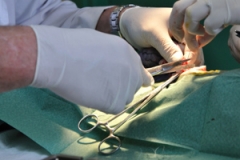



Put simply, a veterinarian is a doctor who studies animal health; prevents, diagnoses, and treats diseases and health issues in animals; and helps protect the welfare of animals and people. Veterinarians are knowledgeable and well educated on many aspects of animal care and fulfill a range of roles across the private and public sectors. You can find veterinarians working at small animal clinics, emergency and specialty hospitals, universities, research facilities, pet food and drug manufacturing companies, and government organizations.
Most veterinary degrees require at least six years of study at the university level, including a minimum of two years of pre-veterinary education and four years in a veterinary medicine program. Veterinary students usually spend 4,000 hours or more in classroom, laboratory, and clinical study.
To stay current with veterinary medicine, techniques, and technology, practicing veterinarians undergo continuing education such as reading scientific journals and attending continuing education symposiums, seminars, and courses. Continuing education standards are mandatory to retain a license to practice veterinary medicine.
Getting into veterinary school is extremely competitive. Because veterinary programs have a limited number of positions to fill, not all students who apply get in. Those who hope to become a veterinarian must have high grades in their pre-veterinary studies. In addition, any real-world experience or additional years of college may be beneficial.
Ownership of a pet is a responsibility that should not be taken lightly. This responsibility does not change based on the type of pet you may get. Whether you are looking at a dog, cat, bird, ferret, rabbit, rodent, reptile or amphibian, each have as much right to a healthy life as the next. Appropriate research should be done on the habits and needs of the animal you would like to get. Financial costs for daily maintenance, proper living conditions, dietary needs and preventative medical requirements should be factored into the decision to get the pet in the first place. Your lifestyle habits also need to be weighed against the needs of the pet you wish to get. Simply “wanting” the pet is not justification alone to getting one. Many times, the hardest decision to getting a new pet is recognizing that you may not be currently ready to take on this responsibility, be it emotionally or financially, and therefore not getting the pet. Once you are in a position to embrace all of the responsibilities of pet ownership, you can enjoy your pet fully without the stresses of cost or other factors.
Besides being unethical and illegal to prescribe medication over the phone, veterinarians can’t accurately diagnose or treat a pet without physically examining him or her. Veterinarians appreciate observant owners and want to hear their description of the pet’s symptoms. However, many diseases have the same symptoms but require different treatment. To determine the cause of the symptoms and ensure the best outcome, the veterinarians at our Istanbul clinic need to examine the pet in person and sometimes perform diagnostic testing. Treating a pet for the wrong disease will cost more in the end and could be harmful or even deadly to your pet.
The fees you pay for veterinary services take into consideration a number of factors, including the costs to compensate your veterinarian and veterinary team for their professional services and the expenses involved in maintaining the hospital and equipment. When someone decides to adopt a pet, he or she needs to be prepared to include annual veterinary care in the overall cost of owning the pet.
Thanks to advances in veterinary medicine, pets are living longer, which means you may be spending more over the lifetime of your pet. However, in general, the annual cost of caring for a pet hasn’t increased much over the past several decades. (Consider how much the costs of many professional services, such as human healthcare, have risen over that same period!) Certain advanced procedures may come at a higher cost, but as the owner, you decide what care you want to provide your pet. Overall, veterinary care is a terrific value for pet owners.
It may seem like you’re paying more for your pet’s care than for your own, but that perception may stem from the fact that you’re paying the entire cost of a service or procedure, whereas most human healthcare procedures and costs are covered by the SGK or private health insurances . In the case of dogs and cats, there are several pet insurance plans available that might help offset the costs but it is not as efficient as in the Europe ,America or in Canada. These plans may cover or help keep costs down for many routine veterinary services, prescriptions, medical conditions, and diseases. Unfortunately, there is no pet insurance for exotic animals such as birds, ferrets, rabbits, rodents and reptiles. Your veterinary hospital may also offer a third-party healthcare line of credit as an option. Be sure to ask at your hospital if they accept any of these plans.
A veterinary technician is trained to assist veterinarians in caring for pets. These professionals perform many of the same tasks that a nurse would for a doctor. Veterinary technicians have received extensive training, either in accredited programs or on the job. Responsibilities vary among clinics, but the basic duties remain the same. For instance, technicians collect patient samples, perform lab tests, assist during surgical procedures and dental cleanings, and take x-rays. Senior techs also train and mentor other staff members.
Supplements, and nutraceuticals in particular, are becoming very popular with pet owners. The veterinarians at our Istanbul clinic can help you weed out confusing and conflicting information and advise you on any supplements from which your pet might benefit.
What you feed your pet will likely be the single most important decision you will make affecting your pets overall health. This differs for each pet, although many commercially available foods are available for many different species. Some species have very specific dietary needs. Pets’ nutritional needs can also change, depending on their life stage and health. The veterinarians at our Istanbul clinic can recommend a pet food, as well as give you advice on deciphering ingredient lists and determining how much to feed your pet.
Regardless of the species, we understand that losing a pet can be extremely upsetting and hard to move beyond. We have such a close bond with our pets, so letting go is never easy. Some veterinary colleges and professional organizations offer grief counseling. You can contact us and the doctors and staff at our Istanbul Clinic can recommend resources to help you through this sad transition. You can also find some helpful information in our Links page.
Even though your pet may be showing the same symptoms as he or she did the last time, the problem may be different. Many diseases have similar symptoms, and the veterinarians at our Istanbul clinic need to examine your pet to ensure that he or she correctly diagnoses the cause.
Many clinics offer veterinary-approved toys and accessories for pets. With all of the options out there, sometimes it’s hard to figure out what’s safe. Our Istanbul Clinic can recommend toys based on your pet’s species, needs, and interests.
Certain behaviours can be extremely frustrating and difficult to overcome. Many veterinary hospitals offer behaviour counselling. Call our Istanbul Clinic to set up a behavior assessment.
Modern anesthesia is generally quite safe. Most veterinary hospitals perform a physical examination and run blood tests before all procedures requiring general anesthesia to make sure your pet doesn’t have any hidden health issues. In addition, a skilled veterinary technician will be monitoring your pet’s vital signs during the procedure, to ensure your pet’s safety or to catch and treat any potential concerns as quickly as possible. Anesthesia and patient monitoring vary greatly from clinic to clinic. Please feel free to ask our Istanbul Clinic what we do to protect your pet before, during, and after the use of anesthesia.
You can turn to the Pet Health Section of our website, which offers current, trustworthy information on a wide variety of topics. In addition, many veterinary colleges and professional organizations offer excellent resources online. The veterinarians at our Istanbul Clinic will also be happy to discuss your pet’s health in more detail.
Not any more than a regular vaccine injection. For mammals, the chip is inserted at the back of the pet’s neck, where the skin is loose. In birds, it is placed into the breast muscle. Microchipping is a safe and effective way to identify your pet in case he or she becomes lost.
Your pet’s microchip should continue to function over your pet’s lifetime without any maintenance; however, the system won’t work unless you keep your contact information current. Whenever you move or change your phone number, make sure you update that information with your pet’s microchip manufacturer. Remember to also get your pet new ID tags at the same time.
Although natural remedies may offer some protection or repellency against parasites, they are not nearly as effective as prescription products. In addition, natural remedies often need to be applied far more frequently than once a month, making them less convenient as well. Some, such as garlic, may actually be harmful to your pet.
Just because a product has “natural” on its label doesn’t mean it’s safe. Consult with the veterinarians at our Istanbul clinic before using any over-the-counter preventives on your pet.
Fleas and ticks are not just minor nuisances; they can transmit serious and sometimes life-threatening diseases, some of which can be passed to people. Even indoor-only pets are at risk because fleas and ticks can hitch a ride inside on your clothing, shoes, or other pets. Keeping your pet on a monthly preventive is your best bet for protecting your pet—and your family—against these parasites.
Fleas and ticks can both hitch a ride on clothing, so every time you come back into the house, you could potentially be bringing these parasites in with you.
Although you can’t always protect your pet from coming in contact with these bloodsucking insects, you can help protect him or her from the diseases they can transmit. Ask our Istanbul veterinary hospital to discuss the benefits of preventives with you.
Never give your pet medication intended for people unless your veterinarian has prescribed it. Most over-the-counter pain relievers, such as acetaminophen (Tylenol) and ibuprofen (Advil ), can have serious, potentially fatal consequences if a pet ingests them.
A variety of pain medications are available for dogs and cats. The veterinarians at our Istanbul Clinic can help you determine which one will fit your budget and help alleviate your pet’s pain.
During your pet’s wellness exam at our Istanbul Clinic, your veterinarian will take your pet’s history and perform a thorough physical examination. Depending on the type of pet, he or she will also give your pet appropriate vaccinations and perform a diagnostic workup, which may include blood, fecal, and urine tests to check for parasites and underlying diseases. Your veterinarian will prescribe preventives and may recommend dental work or other follow-up care. The specific services provided during the exam will vary depending on the species of your pet, your pet’s age, and specific risk factors they may be exposed to. You can help by letting your veterinarian know if you’ve noticed any unusual behavior or physical changes in your pet.
When you consider the cost of prevention versus the cost of treating a disease or condition, you’ll find that treatment is often far more expensive. Many of the exotic animals kept as pets are not far removed genetically from their wild counterparts. This means that many wild instincts are still very much prominent in them. One of the most relevant instinct is the ability to hide or compensate for illness or underlying disease, in many cases, not exhibiting prominent signs or symptoms until the disease is very advanced. At that point, treatment is not only expensive, but the disease may be too advanced to be treated successfully. The results can be very tragic. The veterinarians and staff at our Istanbul Clinic are trained to recognize the subtle changes that may be easily missed. Catching potential problems when they are in their infant stages will allow us to initiate a treatment plan to keep your pet healthy and with you for as long as possible. When you keep your pet up-to-date on preventive care, you’ll know that your pet won’t have to suffer from a condition that could have been prevented or treated.
Your veterinarian will determine which vaccinations are appropriate for your pet, based on individual factors, such as species, lifestyle and health status. Veterinarians commonly recommend that dogs be vaccinated against rabies, distemper, and parvovirus and that cats be vaccinated against rabies and panleukopenia (feline distemper). Ferrets are recommended to be vaccinated against rabies and distemper. Additional vaccines, such as feline leukemia virus (FeLV), Bordetella (kennel cough), may be recommended based on your pets’ species and risk.
Many of these diseases can be fatal to your pet. Preventing them is far easier and less expensive than treatment. If you would like more information on vaccines, ask the veterinarians at our Istanbul Clinic.
Many areas have laws that require dogs and cats (and sometime ferrets) to be vaccinated against rabies. These laws help protect both pets and people from this deadly disease. Check with the veterinarians at our Istanbul Clinic to learn local requirements and to find out what he or she recommends. Except in certain rare cases, a veterinarian needs to examine a pet before the vaccine is given.
Because of rabies laws, control and prevention programs, and pet owners’ cooperation, domesticated pets in North America rarely become infected with this disease. By keeping your pet up-to-date on his or her rabies vaccination, not only are you protecting your pet, but you’re also helping to eradicate rabies from the pet population in your community.
Just like human doctors, veterinarians are expected to meet minimum standards of care (as overseen by veterinary regulatory authorities). Thus, the quality of care your pet receives should not change based on the fees charged for services. However, if prices are considerably lower at one clinic, you should ask for clarification about what the procedure or treatment includes. You may find substantial differences in the level of care provided by that clinic.
Unfortunately, there is no health insurance fore birds, ferrets, rabbits, rodents, reptiles or other exotic pets.
Several companies offer health insurance for dogs and cats. These plans have premiums and deductibles, just like human health insurance plans. The premiums and deductibles vary based on the level of coverage you select. Many routine services, such as office visits and diagnostic testing, are covered, as well as prescriptions, procedures, and surgeries for a wide variety of diseases and conditions. However, there are restrictions and limits, as well as certain guidelines to follow, including making sure your pet receives regular preventive care.
Please ask our Istanbul Clinic for more information about pet health insurance.
Many veterinarians who see a pet on a regular basis, under extraordinary circumstances, may be willing to work with the owner to come up with a payment plan. This is one of many reasons why it’s a good idea to keep up with your pet’s routine care. Owners whose pets don’t receive regular veterinary care will have a harder time finding a veterinarian who is willing to provide services without guaranteed payment. Contact our Istanbul Clinic to see if there are any alternative payment options available.
Relatively speaking, veterinary care is a great value! The cost of veterinary care has risen very little over the last 20 to 30 years, especially when compared to the cost of human health care or almost any other services.
Veterinary fees are a reflection of the costs of maintaining suitable facilities, equipment and support personnel to provide the level of care that is expected in animal medicine today. Remember, too, the original cost of the animal has no bearing on the cost of services delivered. Annual veterinary care is a cost that should be factored in to the decision to own a pet.
Each veterinary hospital sets its own fees. These fees are largely based on expenses, such as salaries, utilities, and rent, that all vary from one area to another. However, the services that are covered under the same procedure or treatment may also differ from clinic to clinic. Medications, medical techniques and products, anesthetics, and equipment can all affect the cost of services.
Spaying and neutering can have major benefits for your pet, including lowering or preventing the risk of several diseases and types of cancer. Your veterinarian will be happy to discuss these benefits. In addition, spaying and neutering help control the pet population by reducing the number of unwanted pets.
Spaying and neutering are surgical procedures that require your pet to be put under anesthesia. The cost of these procedures takes into account the anesthesia, your veterinary team’s time and expertise, monitoring, drapes, suture material, and hospitalization. Spaying or neutering your pet is much less expensive than dealing with potential pregnancy complications or reproductive diseases.
In an effort to stress the importance of them and encourage you to have your pet spayed or neutered, standard elective spay and neuter procedures are discounted procedures. If billed as a normal surgical procedure, they would cost 2-3 times the current costs. Contact our Istanbul Clinic to discuss any concerns you may have with spaying or neutering your pet.
As the owner, it’s up to you to decide how much money and care you’re going to put into your pet. Each pet owner has his or her own idea of what constitutes reasonable pet care. Your veterinarian recommends services, procedures, and preventive measures that he or she feels will benefit your pet. The owner makes the final decision as to what options to provide.
The veterinarians at our Istanbul Clinic understand that the cost of taking care of a pet can sometimes seem overwhelming, and they will do what they can to help owners. For instance, your veterinarian can often provide suggestions for how to stay within your budget, such as spreading out routine services. However, when someone decides to take on the responsibility of caring for a pet, he or she needs to be prepared for the expenses associated with veterinary care and to compensate veterinarians for their time and expertise.
Just like your doctor, dentist, and most other professional offices, veterinary facilities usually require payment in full at the time of service. You can call before routine visits and ask about the hospital’s payment policy, as well as any alternative payment methods. Most veterinary facilities accept major credit cards, and some also accept veterinary insurance plans.
If you would like help in preparing for pet care expenses, contact our Istanbul Clinic. We can advise you on how much you can expect to spend on routine care for your pet, as well as how to prepare for emergency care. In addition, your veterinarian can help by spreading out preventive health care services over several visits.